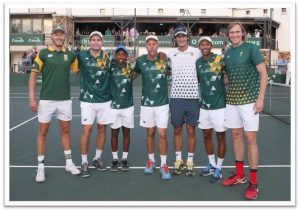How Siya Nkachela, founder of Tennis Lab SA is looking to change the landscape of tennis
32 years after grasping a tennis racket for the first time, Siya Nkachela continues to push for more progressiveness in tennis. From Mahikeng to Athens, Nkachela has provided insight from his experiences as player and coach for the next generation of tennis players that are making it through the ranks.
After creating his company TennisLab, he is more assertive as ever to bring change to tennis in South Africa.
Growing up in the small town of Mahikeng on the border of Botswana and South Africa, a rare tennis scene allowed Nkachela to develop.
He played for the provincial and national teams around South Africa and secured a scholarship at the University of Pretoria. Nkachela spoke to the Sports Gazette about his tennis days and what change he desperately wants to see.
“When I came to the University of Pretoria I was given a full scholarship and the first two months I had to prove why I had a full scholarship, not to the people who warranted me the scholarship but to my fellow players because I was called all sorts of names like quota player, development player etc” he said.
That pushed him to reach a new level on the court, proving everyone wrong by ranking number one for the five of the six years. After university, he got into coaching and established himself as an astute coach. This included a trip to Athens in 2004 as the Paralympics wheelchair tennis coach. Currently he is the coach of Kgothatso Montjane, the wheelchair tennis star that’s ranked seventh in the world.

However, his experience with the Tennis Federation while coaching the South African Under 16s made him realise the deep-rooted issues he was trying to change still existed. Which left him disgruntled.
“I thought I could change the system by going inside and making an input but found out that when I was there, the system is still the same as it was in the 90s.
“So I rode my two years and I decided not to renew because if I did I would be still promoting and perpetuating the same things I’m against, so let me fight it from the outside because I tried on the inside,” he said.
This was because of the federation’s attempts to silence Nkachela attempts to speak up on the injustices he saw first-hand taking place in tennis regarding people of colour.
He echoed the sentiments of many African parents who feared the victimization which would result in the exclusion of their children from the national teams. So he decided to use his platform to take this head on.
“If diplomacy doesn’t work you need to get radical because there’s no revolution that was won by anyone that said “let’s sit at the table and sign a pact”. It never was that way. Sometimes you need to go very radical. A coup d’etat is supposed to happen if the system is not compliant and not responding to the diplomatic style you are taking.” he says.
Nkachela is using his company Tennis Lab SA to create more opportunities to enhance the development for young South Africans tennis players. He has been tournament director for a number of tournaments like the African Grand Slam (the first in Africa) and the Kempton Park Tennis Open. Even though he is putting in the hard yards, he still thinks there is a lot of work to do. But he has a plan.
His idea of development and transformation goes beyond race and it is a plan that will need tremendous backing that would influence the trajectory of tennis in South Africa as well as increase the culture of it.
Going into wards and creating an environment where each street would have to produce a tennis player. Bringing tennis into the homes will allow it to be competitive at schools where the kids from these wards would start to compete at different structures, like schools, provincially and then nationally. Something identical to the schoolboy rugby system. This plan can only work with the correct infrastructure and money.
The only way it will work is if there’s a full blown project and people at hand to help with training, nutrition and mental health in order to prepare the youth for life in high performance sports. Once you create this environment, the competitiveness will grow thus saving the South African tennis scene.
“If it’s race, religion or creed related then it poses a problem. That’s why we will always have all these issues of in-fighting and people saying, “you a quota, you don’t have to do much to get in there” but the truth is i did have to do much to get in”.